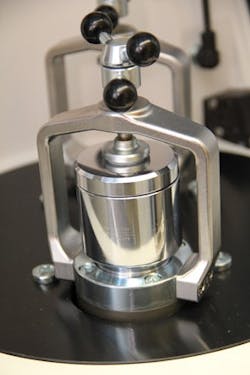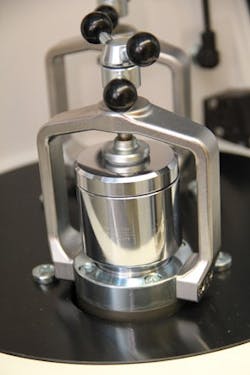Method Shakes Up AMH Synthesis
A process based on mechanical ball milling promises to produce alkali metal hydrides (AMHs) at lower cost than current methods, believe its developers at the U.S. Dept. of Energy’s Ames Laboratory, Ames, Iowa. The process rapidly converts ductile alkali metals into AMHs without the use of solvents and catalysts, they add. Moreover, the reactive mechanical milling avoids the hazards posed by the high temperatures used in conventional production.
“These alkali metals — lithium, sodium, potassium, rubidium and cesium — form hydrides that are relatively stable, salt-like compounds,” notes Vitalij Pecharsky, a scientist at Ames and also a professor of materials science at Iowa State University. “Typically, you need high temperatures (for example, 700°C for lithium) to melt them but even then, a hydride crust forms on the liquid which prevents additional hydride molecules from forming, so it also requires a catalyst.”
Figure 1. Shaking of canister, which contains stainless steel balls, induces mechanical forces that drive the reaction. Source: Ames Laboratory.
In contrast, the new one-step process involves room-temperature ball milling in the presence of hydrogen gas. The milling fractures the alkali metal particles, exposing fresh surfaces to the hydrogen, thus promoting continued reaction. The metal hydrides form easily without the need for a catalyst.
“One problem with ball milling is that lithium and related metals are ductile, so they have a tendency to clump up or turn gummy when you mill them… But we found that by simply adding a small amount of lithium hydride or monohydride of the corresponding alkali metals early in the process, it eliminates the cold welding,” explains Pecharsky. The process also avoids impurity formation, which can occur in high-temperature production when the alkali metal reacts with the crucible, he adds.
Scaling-up the process to production level will depend upon lining up an industrial partner, Pecharsky notes. Iowa State’s Office of Intellectual Property and Technology Transfer is working to identify potential licensees. A key challenge will be to establish or modify commercial-scale milling infrastructure with proper controls of air and moisture levels, he says.
Reactive mechanical milling has broader applicability, comments Pecharsky. “There are a variety of air-sensitive materials that can benefit from this approach. These include but are not limited to other binary and tertiary hydrides, nitrides, phosphides and chalocogenides of alkali, alkaline earth, rare earth and transition metals.”
The researchers currently are investigating some of these syntheses.
“Mechanochemical solid-gas syntheses appear to have a bright future and potentially may replace many of the thermally driven processes, thus reducing energy requirements and making products more cost effective,” he stresses.

